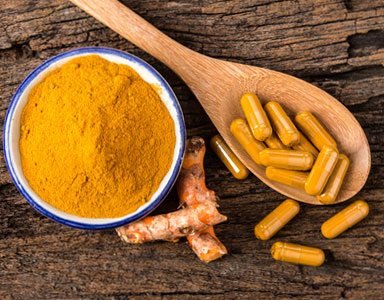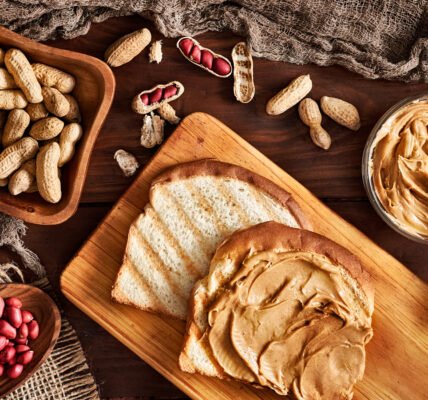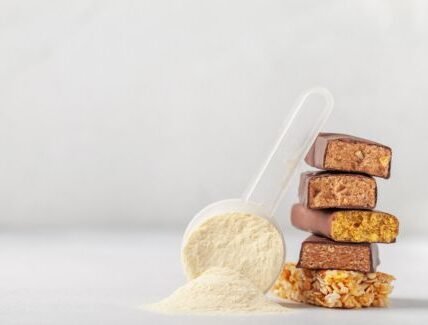[ad_1]
A healthy diet not only supports us physically, but mentally, evidence shows. Vanessa Chalmers talks to nutritionist May Simpkin about the healthy foods that fight depression
One in for people will experience a mental health problem every year in the UK, according to Mind. When we take into consideration the friends and family that have faced a mental health problem, 95 per cent of us are being effected by it all together, according to this survey.
This makes it a growing public health concern, especially as in 2016, 64.7 million anti-depressant prescriptions were written by the NHS, an increase from 31 million in 2006.
MPs are demanding more funding and charities are urging people to talk more, but how else can we tackle poor mental health? Evidence is showing that a nutritious diet is more influential on our mental health than we realise.
The Mental Health Foundation comments that ‘food plays an important contributing role in the development, management and prevention of specific mental health problems such as depression, schizophrenia, attention deficit hyperactivity disorder, and Alzheimer’s disease’.
Those who reported a mental health problem of any degree also reported a less healthy diet
Nutritional therapist May Simpkin agrees, seeing the alleviated symptoms of depression due to fundamental changes in the diet every day in her practice.
‘I believe depression is the symptom of an imbalance in the body and as such, it is important to get to the root cause of this imbalance and address this imbalance, rather than masking its symptoms’, May says.
According to the Mental Health Foundation, those who reported a mental health problem of any degree also reported a less healthy diet, in terms of fresh fruit and vegetables and cooking from scratch. Instead, crisps, chocolate, ready meals and takeaways were on the menu.
‘It’s no coincidence that the rise in mental health problems in the last 50 years also accompanies a rise in the consumption of processed foods and less fresh fruits and vegetables’, says May.
‘The brain works hard 24/7 and needs to be constantly fuelled from the foods we eat. Without this fuel, brain function will be affected and ultimately, so will your mood.’
To keep the body working in tip top condition to support mood, May Simpkin never lets her cupboards fall short of the following foods.
READ MORE: ‘Don’t tell me to cheer up’ – 10 positive mindset steps for your Mental Health
Healthy Food #1 Salmon
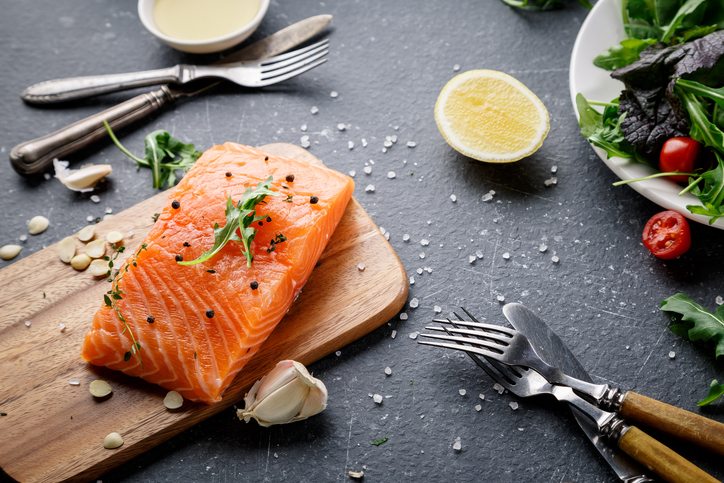

Nutritionists such as May are always on at us to, ‘eat 2 to 3 portions of oily fish, like salmon, a week’ and with such a huge scientific backing for its benefits, we’d be silly not to.
Oily fish is considered a ‘brain food’, high in omega-3s which influence the production of neurotransmitters (brain chemicals responsible for our moods), including dopamine and serotonin. By supporting the synapses in the brain, omega-3s also boost learning, memory, and can even prevent the excessive inflammation that causes dementia.
Enough scientific support exists that the 2015 Dietary Guidelines, which is designed to help Americans eat a healthier diet, concluded that a diet rich in seafood, which is a major source of omega-3 fats, as well as vegetables, fruits, nuts, legumes was generally associated with a lower risk of depression.
Healthy Food #2 Tinned sardines or tinned mackerel
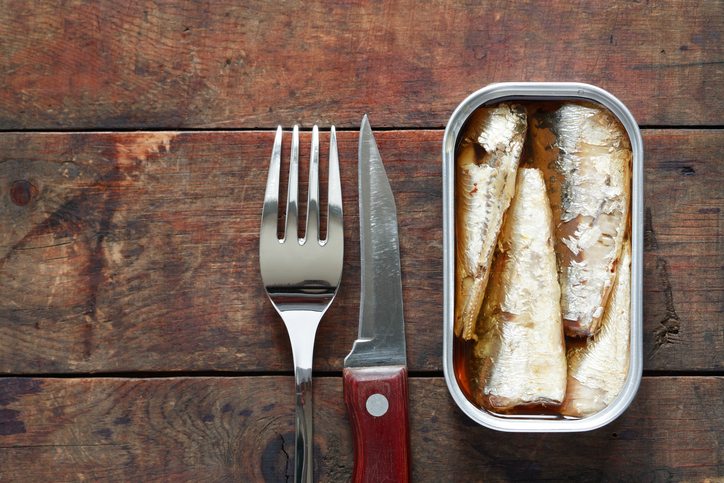

Fish again, but this time it sounds a bit like something your grandad ate in his sandwiches for tea. But tinned tuna, or white fish such as cod, haddock or plaice won’t have the same benefits that tinned sardines and mackerel do.
‘Sardines and mackerel, which you can get tinned, are really high in omega 3s’, says May.
‘These are anti inflammatory oils which are key for mental health because they are important for nerve health. We have a layer of fat on the outside of each nerve so we need to eat fat to support them, as well as being able to transmit neurotransmitters such as serotonin, the feel good neurotransmitter. If your nerve health isn’t good you won’t be able to do that efficiently.’
You can get the strong flavoured fish in any supermarket, often doused in a sauce such as Teriyaki. Use it as the protein in a salad or in a classic Arrabiata pasta – it’s distinct flavour will take you to Italy.
May recommends getting creative – ‘You can think differently about using these ingredients. Try making things like a pate to have instead of the usual houmous or cream cheese.’
Healthy Food #3 Walnuts
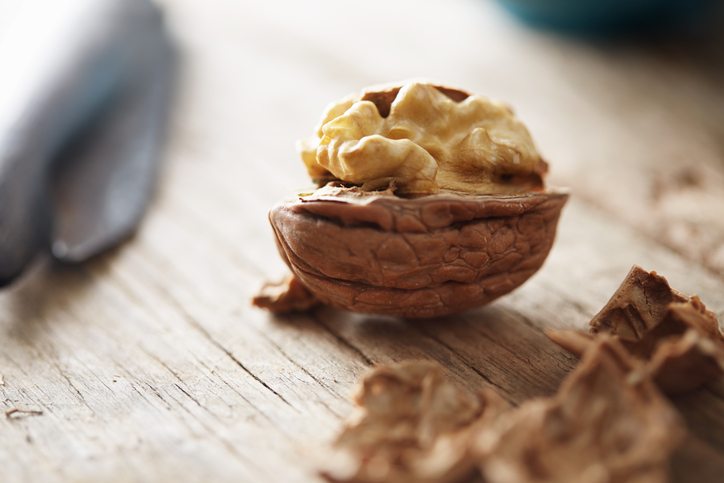

Now, we don’t like to discriminate, but May points out that ‘Walnuts are the most important in the nut group. They contain high omega 3s which is essential for good nerve and mental health.’
Those omega 3’s again, which aren’t so difficult to get into the diet when available as a snack form. Our bodies can’t function healthily without essential fatty acids, and studies continue to show that foods such as walnuts reduce symptoms of schizophrenia, depression, attention deficit hyperactivity disorder and other mental disorders.
Walnuts are so versatile, with a smooth taste which some find bitter and others find sweet. They can be thrown in almost any meal, as a nut butter, eaten alone as a mid-afternoon snack in a trail mix or as a walnut oil in baking.
READ MORE: Are you at risk of osteoporosis? 3 ways to keep your bones healthy
Healthy Food #4 Flax and chia seeds
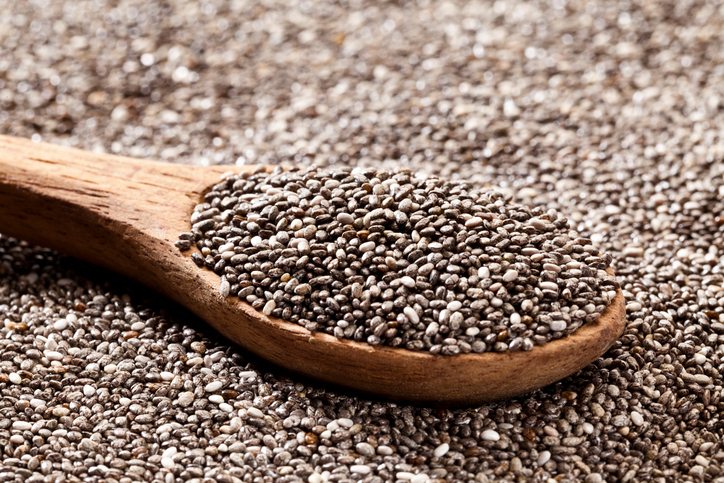

‘Flaxseed and chia seeds are your best vegan options for omega 3s. You can have flaxseeds as an oil or grounded, and chia seeds can be thrown into smoothies, yoghurts or sprinkled over meals’, says May.
You may have passed flaxseed on the supermarket shelves without much care, but this versatile food has been shown to have heart-healthy effects, as well as being high in ALA.
ALA is a mostly plant-based omega 3 fatty acid, and a tablespoon of ground flaxseed contains about 1.8 grams of omega 3s. Our brain tissue is rich in omega-3 fatty acids, which are of vital importance within cell membranes and in connections between nerves, and evidence, such as this study in Budapest, shows that a lack of supporting omega 3s in the diet is linked to, amongst mental health issues, higher levels of impulsive behaviour, hostility, and cynical ideas.
‘You should eat 2-3 portions of oily fish a week but that’s why I supplement with clients so often as its hard to hit that’, says May.
The committee for the 2015 Dietary Guidelines reported that there is such sufficient evidence on EPA and DHA (the omega-3 fatty acids eicosapentaenoic acid and docosahexaenoic acid), that omega 3 supplements are now considered ‘complementary therapy’ for major depressive disorder, meaning using it alongside your conventional medical treatment may help you feel better.
An impressively large Norwegian study of nearly 22,000 participants demonstrated the benefits of taking an omega 3 supplement. It found that those who regularly took cod liver oil, which is rich in omega-3 fatty acids, were about 30% less likely to have symptoms of depression than those who did not. The longer the participants took cod liver oil, the less likely they were to have high levels of depression.
Healthy Food #5 Protein
Vegan or not, the body needs protein to fuel the feel-good mood. Many neurotransmitters in the brain are made from amino acids, which are built up with protein.
Dopamine is made from the amino acid tyrosine and serotonin is made from tryptophan, and a lack of these two amino acids is associated with low mood and even aggression in some, according to this paper.
Up to 12 of the amino acids are made within the body itself, however the remaining eight must come from our plates. Foods rich in protein include meat, milk, eggs and plant proteins such as beans, peas and grains.
adults are advised to eat 0.75g of protein for each kilogram they weigh
Protein powder is in abundance to help people hit their daily needs. In the UK, adults are advised to eat 0.75g of protein for each kilogram they weigh, based on the Reference Nutrient Intake (RNI). On average, men should eat 55g and women 45g of protein daily, which is about two palm-sized portions.
‘I try and have protein with every meal’, says May.
‘I tend to use protein powder in a shake but you can use it to supplement a cake mixture or even a brownie mixture.
‘You can sprinkle it on top of yoghurt with some fruits. With any nut milk you can make a milkshake’.
Healthy Food #6 Miso paste
Another influencer on those all important serotonin and dopamine transmitters is the balance of the sex hormones, oestrogen and progesterone.
‘Balancing hormone levels with the diet should be considered in the first instance before beginning antidepressant medication’, says May.
Eating phytoestrogen foods (meaning literally, plant-based oestrogen foods) that mimic the body’s natural oestrogen will help to balance oestrogen levels in perimenopause (the decade before menopause) and menopause.
Phytoestrogens include all vegetables, beans and pulses, but also soya bean based products such as miso paste.
‘Foods that mimic oestrogen and trick the body into thinking it has more don’t get the same negative symptoms of menopause or PMS which can be debilitating’, says May.
‘You can use miso to make a clear broth soup with it and use it as a stock instead of a stock cube.’
READ MORE: 7 natural energy boost tips to try this summer
Healthy Food #7 Most nuts and seeds
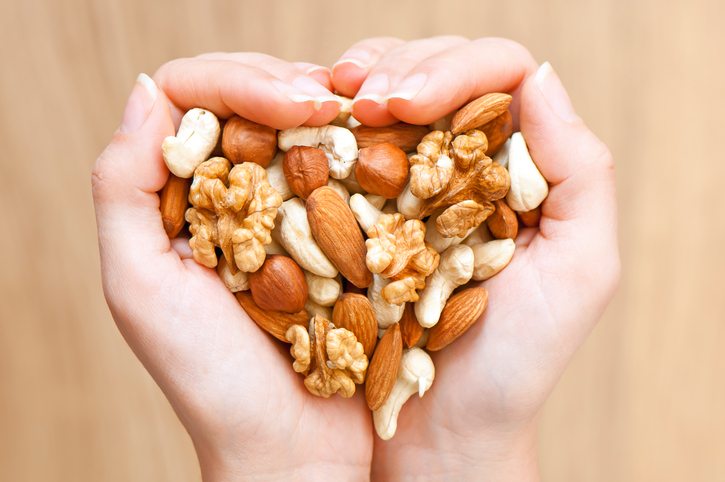

We always said nut butter makes us happy. But May Simpkin says snacks such as these are far more mood friendly than we realise, in comparison to favourites such as biscuits, cakes and pasties.
In fact, May suggests to avoid refined sugars all together as they are quickly absorbed into the blood providing a short-lived surge of energy.
‘You’ll come crashing down not long after as insulin is quickly released to remove the sugars from your blood. This dip will leave you feeling tired, lethargic and jittery and can further contribute to anxiety and feeling low.
Nuts and seeds also have a high protein content
‘When your blood sugar is low and you need a boost, a fruit snack will give you that. But have some nuts too to balance the release of sugar in the blood. It won’t be such a surge’, advises May.
Nuts and seeds also have a high protein content, particularly pumpkin seeds, peanuts, pistachios, almonds, sunflower seeds, sesame seeds, and flax seeds, which help contribute to the building of amino acids – essential for a healthy and functioning mind.
Healthy Food #8 Pickles
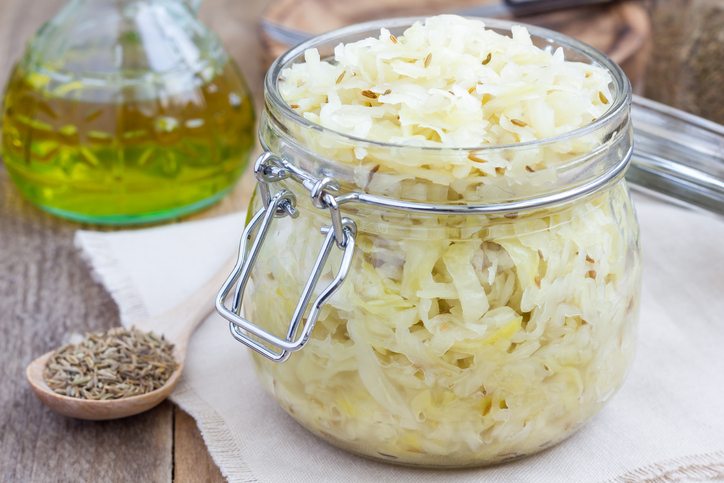

With a huge shopping list at the ready for mood-boosting foods, you can’t go wrong. Except, May warns that unless the gut is in optimal health too, the absorption of nutrients won’t be as efficient.
‘Around 95 per cent of serotonin is produced in the gut and your gut flora plays an essential role in ensuring a healthy digestive tract’, she says.
To introduce good quantities of new good bacteria into the gut microbiome, May suggests looking towards fermented foods such as pickles, kimchi and sauerkraut, which are full of probiotics.
They contain a bacteria called Lactobacillus plantarum which is a powerful bacteria which dominates and competes for nutrients that the bad bacteria need to survive.
fermented foods such as pickles, kimchi and sauerkraut, which are full of probiotics
You can make pickles yourself (look at our beginners guide to fermenting foods), however it is easy enough to pick something up in a health food store or receive in a monthly subscription. Most fermented foods have a distinct taste, and a little goes a long way.
Introduce foods such as these slowly, just one teaspoon a day will do, as adding them to the diet can cause ‘detox’ symptoms such as constipation or diarrhoea, headaches, rashes and flu symptoms – stick with it and be patient to get great gut results.
READ MORE: Fermented foods – are they worth the hype?
Healthy Food #9 Kefir
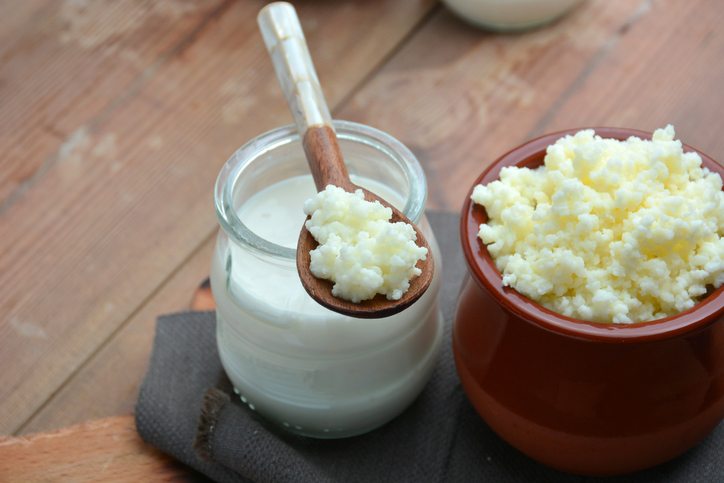

Kefir is another probiotic powerhouse, the ‘richest source’, according to May. The healthier the gut, the healthier the brain, as science is slowly linking the two. For example, this recent study published in the Journal of Psychiatric Research suggests bacteria in the microbiome is linked to bipolar disorder.
By analysing stool samples, researchers compared the gut microbiome of 115 people with bipolar to a control group of 64 indidduals. They found that the gut bacteria of those with bipolar were significantly different and concluded looking at gut health was an effective path for treatment.
Kefir is a fermented milk drink with a tart, fizzy taste that some describe as similar to yoghurt. It is made with kefir grains (these are a live bacteria that work as a starter culture) that look a little like white frog spawn (see below) fermented in either water or any type of milk over 24-36 hours. It’s slowly becoming more available in the UK, with the traditional home-made stuff boasting the most strains of bacteria.
The healthier the gut, the healthier the brain
If fermented foods are too much of a faff, there are easier ways to introduce the good bacteria.
‘You may like to consider a good quality probiotic to re-innoculate your gut at the outset whilst you make changes to your diet’, says May.
Research between probiotics and mental health is slow, however there are some studies are linking the two.
For example, this study conducted at the Leiden Institute of Brain and Cognition tested 40 adults, who didn’t have mood disorders, with a depression sensitivity scale before a four week trial. Half of the group took a probiotic every day and the other half took a placebo.
After the trial, people who took the probiotic reported significantly less reactivity to sad mood than the control group—meaning that when they were put in a sad mood, they had fewer recurrent distressing or aggressive thoughts, although researchers didn’t record if they ate more probiotic foods.
READ MORE: Mental health & gut health: experts explain the link between your brain and your gut
Healthy Food #10 Chocolate
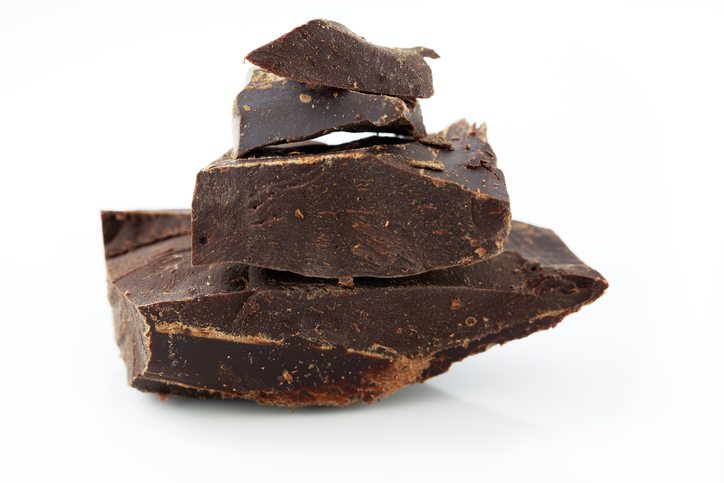

The more raw, the better.
‘Raw chocolate, as well as being lower in sugar, has higher cocoa solids, so you’re getting the real benefits of the antioxidants. Antioxidants are good because they mop up the free radicals that around your body that have been produced by your body being out of kilter’, says May.
Free radicals are sometimes created naturally in the body, however environmental factors such as pollution, radiation, herbicides and cigarette smoke can spur them on. In comes the hero, antioxidants, which neutralise the bad guys – free radicals.
When enough antioxidants aren’t available, serious damage to cells can occur, called oxidative stress, leading to diseases such as cancer.
they mop up the free radicals that around your body
‘By controlling the effects of oxidative stress and mopping up the free radicals, the body can concentrate on working more efficiently and effectively. As the systems in our body are all linked, it is essential to ensure this, otherwise the strain on one system can affect another and this will put stress on the body.
‘This can cause symptoms such as hormonal imbalances and headaches which will affect mood and energy levels’.
Healthy Food #11 Vegetables and fruits
After research by the Imperial College London, it’s now recommended we eat 10 fruit and vegetables a day to really reap the benefits. Each veggie has numerous nutrients and the power of plants show to reduce risk of diseases and prolong life.
For example, fruits and vegetables contain phytonutrients which act as antioxidants in the body that help to reduce inflammation, which has been linked to autoimmune diseases like multiple sclerosis, anxiety and high blood pressure. The antioxidants also fight excess free radicals that can build up because of a poor diet, environmental factors and stress.
Vegetables are also plant-based oestrogen foods, which means they help balance out the sex hormones
These compounds are what give plants their bright colours such as beta carotene (found in orange and green varieties), anthocyanins (found in blue and purple varieties) and lycopene (found in red varieties). Foods that are highest in antioxidants include berries, tomatoes, cauliflower, cabbage and broccoli, which are all beneficial to concentration levels and feeling clear-headed.
Vegetables are also plant-based oestrogen foods, which means they help balance out the sex hormones by mimicking the body’s natural oestrogen. This can help with PMS, menopause and perimenopause symptoms.
READ MORE: Nutritionist explains why the gorgeous Amal Clooney enjoys seaweed as part of her morning ritual
Healthy Food #12 Turmeric
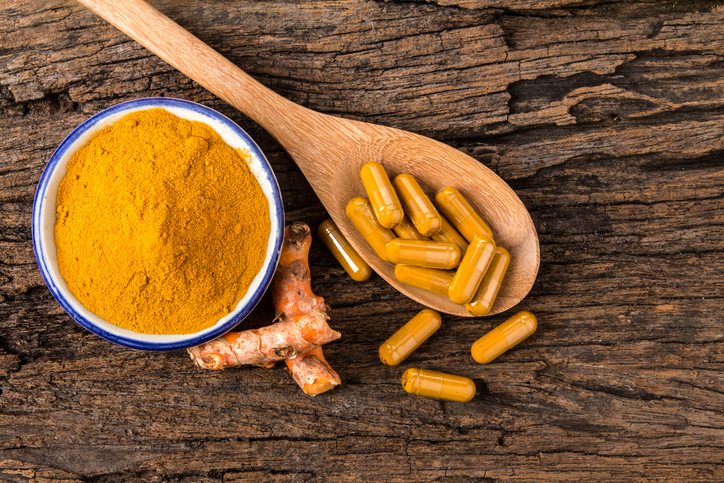

All hail the superfood making its way into supplements, lattes and even face masks. The modern Healthista woman likes to throw it in their smoothie but the golden powder has been used for endless centuries as traditional medicine due to its heralded antibacterial and anti-inflammatory benefits.
Curcumin, a compound, is what makes turmeric so effective. This comprehensive scientific report published in 2013 compiled the results of a collection of clinical trials of curcumin over the prior 50 years, claiming, to quote, ‘promising effects’ for a tremendously long list of ailments.
Inflammation in the body is often caused by stress hormones which is triggered by, you guessed it, stress.
‘Curcumin’s ability to manage inflammation is widespread within the body, inhibiting powerful enzymes that are linked with inflammation’, says May.
‘An excessive amount of inflammation is at the root of many diseases and being able to control inflammation is one of the ways which we can best support our health’.
The spicy plant has been found in research to reverse harmful brain changes induced by chronic stress and simulate the formation of new brain cells to prevent depression.
In fact, curcumin is so potent against stress-induced anxiety and depression that it ‘may prove to be a useful and potent natural antidepressant approach in the management of depression’, according to these researchers.

 May Simpkin is a UK registered practitioner with a Masters Science degree in Personalised Nutrition.
May Simpkin is a UK registered practitioner with a Masters Science degree in Personalised Nutrition.
She is an experienced clinician, practicing functional medicine from an evidence base, providing the latest research into nutrition.
She is bound by the code of ethics in clinical practice and has met the strict criteria required for BANT, the British Association for Applied Nutrition and Nutritional Therapy and the CNHC, Complementary and Natural Healthcare Council, which is the council recommended by the UK Department of Health for complementary and natural healthcare services. She is also Chair of the Continual Professional Committee at BANT.
In addition, she is registered with IFM, The Institute for Functional Medicine and a member of the RSM, The Royal Society of Medicine.
For more information on how to lose weight, nutrient-rich recipes, and ideas visit www.maysimpkin.com or Follow May on Instagram: @maysimpkinnutrition or Twitter @MaySimpkin or Facebook
Like this article? Sign up to our newsletter to get more articles like this delivered straight to your inbox.
[ad_2]
Source link
